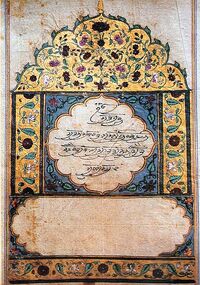
Ik Onkār,[1] a Sikh symbol (encoded as a single character in Unicode at U+0A74, ੴ)
Ik Onkar (Gurmukhi: ੴ, ਇੱਕ ਓਅੰਕਾਰ; Ikk Ōankār Template:IPA-pa) is the symbol that represents the One Supreme Reality[2] and is a central tenet of Sikh religious philosophy.[1] Ik (ਇੱਕ) means one or united,[3] On (ਓਅੰ) means supreme, ultimate, or highest bhrama (God), and the Atma (Soul) of the entire universe or system,[4] and kār (ਕਾਰ) means without shape or form.[5]
It is a symbol of the unity of God in Sikhism, and is found on all religious scriptures and places such as Gurdwaras. Derived from Punjabi, Ik Onkār is the first phrase in the Mul Mantar referring to the existence of "one constant[6]" that is ॐ Om taken to mean "one God".[7] It is found in the Gurmukhi script[8] and is consequently also part of the Sikh morning prayer, Japji Sahib. It is a combination of two characters, the numeral ੧, Ikk (one) and the first letter of the word Onkar (Constant taken to mean God) - which also happens to be the first letter of the Gurmukhī script - an ūṛā, ੳ, coupled with a specially adapted vowel symbol hōṛā, yielding ਓ. "Ik" is the alternative spelling and pronunciation of "ek" i.e. one in Hindi and several other Indian languages, while onkar is another way of spelling and pronouncing (particularly in Gurmukhi and Punjabi) the "Om", or "Aum"—the pan-Hindu symbol that represents the Highest Reality or the Supreme Being. The Gurmukhi letter used to write onkar is also the equivalent to the letter "Om" in Devnagari and other Indian scripts. Thus "Onkar" or "Om-kara" representing the Supreme Divine in Sikhism was the natural outcome of Sikhism as a religion being born within the Hindu cultural sphere, and founded by saints who were Hindus by birth, social identity and beliefs—like the other Indic or Dharmic religions born within the Hindu matrix like Jainism and Buddhism.
In Mul Mantra[]

Illuminated Adi Granth folio with nisan (Mul Mantar) of Guru Gobind Singh, showing Ik Onkār. Collection of Takht Sri Harimandir Sahib, Patna.
It was also the opening phrase of the Mul Mantar, present as opening phrase in the Guru Granth Sahib, and the first composition of Guru Nanak. Further, the Mul Mantar is also at the beginning of the Japji Sahib, followed by 38 hymns and a final Salok at the end of this composition.
- Simplified transliteration: ikk ōnkār satināmu karatā puraku nirapǎ'u niraver akāl mūrat ajūnī sepàng gurprasād
- English: One Universal creator God, The supreme Unchangeable Truth, The Creator of the Universe, Beyond Fear, Beyond Hatred, Beyond Death, Beyond Birth, Self-Existent, by the Guru's Grace.
References[]
- ↑ 1.0 1.1 Sikhism photpack. Fu Ltd.. 2012. p. 10. ISBN 1-85276-769-3.
- ↑ "Basic Articles". SGPC. http://sgpc.net/sikhism/sikhism1.asp. Retrieved 12 August 2012.
- ↑ "ਇੱਕ - meaning in English". Shabdkosh. http://www.shabdkosh.com/pa/translate?e=%E0%A8%87%E0%A9%B1%E0%A8%95&l=pa. Retrieved 20 September 2013.
- ↑ Singh, Sahib (2003). Jaap Sahib Steek. Singh Brothers. p. 90. ISBN 8172050771.
- ↑ "ਅਕਾਰ - meaning in English". Shabdkosh. http://www.shabdkosh.com/pa/translate?e=%E0%A8%85%E0%A8%95%E0%A8%BE%E0%A8%B0&l=pa. Retrieved 20 September 2013.
- ↑ Taoshobuddha (22 Aug 2012). Ek Onkar Satnam: The Heartbeat of Nanak. English: AuthorHouseUK. pp. 438. Template:ASIN. ISBN 1477214267.
- ↑ Mayled, John (2002). Sikhism. Heinemann. p. 16. ISBN 0-435-33627-4.
- ↑ David Rose, Gill Rose (2003). Sacred Texts photopack. Folens Limited. p. 12. ISBN 1-84303-443-3.
External links[]
| ||||||||||||||||||||||||||
| This Creative Commons Licensed page uses content from Wikipedia (view authors). The text of Wikipedia is available under the license Attribution-Share Alike 3.0 Unported (ToU). |
